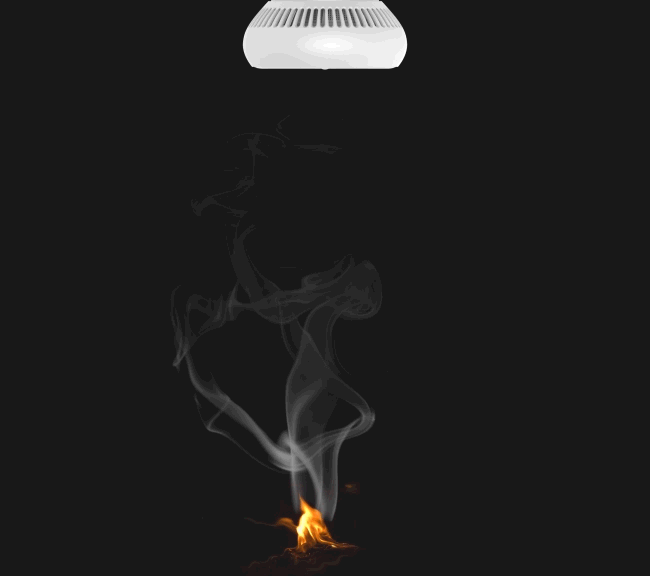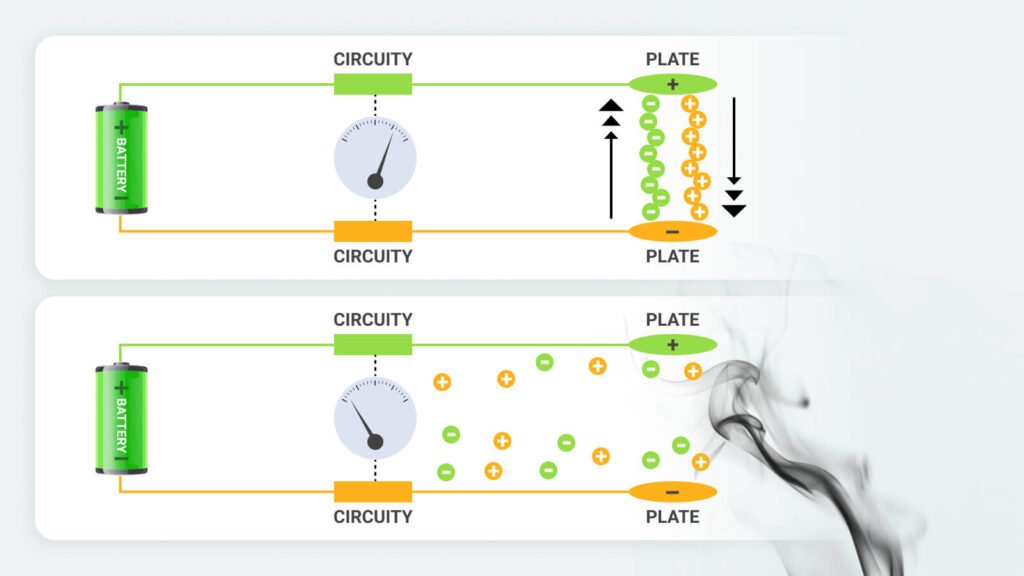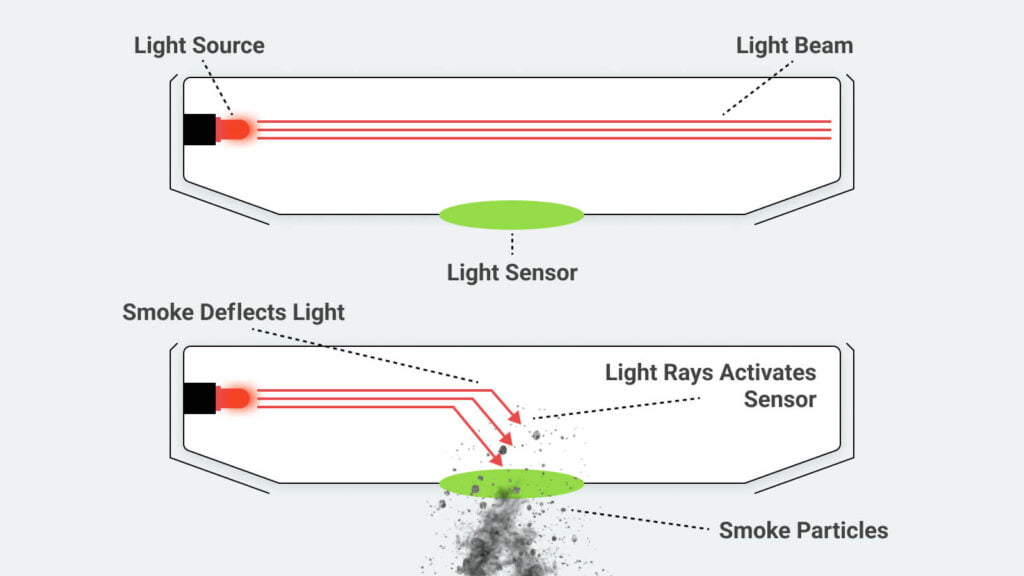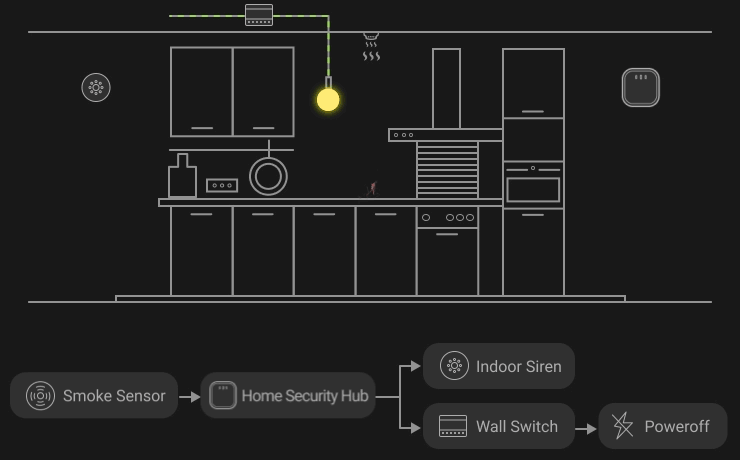In today’s smart home market, reliable fire detection plays a crucial role in safeguarding home environmental health. Two main technologies – photoelectric vs ionization, are dominant in the market and navigating the best option for importers and integrators like you might be a little challenging.
This article delves into the key differences between photoelectric and ionization smoke detectors, empowering you to make informed decisions and equip your smart home security solutions with the most effective fire protection solutions. By understanding the unique strengths of each technology, you can confidently select detectors that align perfectly with the specific fire risks prevalent in your target markets.

Types of Smoke Detectors?
Currently, there are many types of smoke detectors available on the market. Based on detection working principles, they can be mainly divided into ionization smoke detectors and photoelectric smoke detector.
What is Ionization Smoke Detector?

Working Principle: Ionization smoke detectors contain an “ionization chamber” with a small amount of radioactive material, americium-241. Americium-241 releases alpha particles, which ionize the air in the chamber, creating a weak current. When a fire occurs, smoke particles enter the ionization chamber, neutralizing the ions in the air, reducing the current, and triggering the alarm.
Suitable Scenarios: Ionization smoke detectors are more sensitive to smoke produced by flaming fires, such as those caused by burning paper or wood. Therefore, they are suitable for kitchens, living rooms, and other areas.
What is Photoelectric Smoke Detector?

Working Principle: Photoelectric smoke detectors contain an optical chamber with a light source and a photosensitive resistor. Normally, the light source does not illuminate the photosensitive resistor. When a fire occurs, smoke particles enter the optical chamber, scattering or reflecting the light, causing some of it to hit the photosensitive resistor and triggering the alarm.
Suitable Scenarios: Photoelectric smoke detectors are more sensitive to smoke produced by smoldering fires, such as those caused by burning electronics or plastics. Therefore, they are suitable for bedrooms, studies, and other areas.
Difference Between Photoelectric and Ionization Smoke Detectors?
Having understood the working principles and technologies of two smoke detectors, you might already have some idea about how to choose. To help you make a more informed decision, let’s compare their advantages and disadvantages:
| Comparison Item | Ionization Smoke Detectors | Photoelectric Smoke Detectors |
| Sensitivity to Fire Types | More sensitive to flaming fires (e.g., burning paper, wood) | More sensitive to smoldering fires (e.g., burning electronics, plastics) |
| Response Speed | Very fast for flaming fires | Fast for smoldering fires, relatively slower for flaming fires |
| Interference Resistance | Susceptible to environmental factors such as dust, humidity, steam | Strong resistance to interference, less affected by environmental factors |
| Safety | Contains a small amount of radioactive material, posing some radiation risk | No radiation risk, safer and more environmentally friendly |
| Maintenance Cost | Shorter lifespan, requiring periodic battery and sensor replacement | Longer lifespan, lower maintenance cost |
| Price | Relatively lower | Relatively higher |
Both photoelectric and ionization smoke detectors play a crucial role in fire detection, but photoelectric models are more preferred and often get the nod for several reasons:
Enhanced Detection Technology
Photoelectric detectors use light and photoelectric sensors to detect smoke particles. This technology offers greater sensitivity to slow-burning fires, which can be more dangerous due to their delayed smoke production.
Reduced False Alarms
Photoelectric smoke detectors employ sophisticated algorithms to differentiate between smoke and environmental factors like dust or steam. This significantly reduces false alarms, minimizing disruptions and ensuring a more reliable safety system.
Increased Safety and Functionality
Many photoelectric models go beyond basic smoke detection. Integration with temperature and humidity monitors or smart home security system provides additional layers of safety and convenience.
Health-conscious
As public awareness of safety and environmental concerns grows, the radiation-free nature of photoelectric detectors becomes a significant selling point. This has led to increased demand and market positioning in the mid-to-high-end range.
Cost-Effective Safety
Photoelectric smoke detectors require optical components such as light sources (e.g., infrared LEDs) and photodetectors, which are more expensive than the radioactive materials and electrodes used in ionization chambers. On the other hand, photoelectric smoke detectors need a complex “optical maze” structure to reduce environmental light interference and improve sensitivity, increasing manufacturing difficulty and cost.
This results in a slightly higher upfront cost, but the superior performance, reliability, and advanced features of photoelectric smoke detectors translate to a more cost-effective solution in the long run. They offer better protection for modern households with evolving safety needs.

Things to Consider When Sourcing Wireless Smoke Detectors.
Wireless smoke detectors offer significant advantages over traditional wired models, including easier installation and interconnected alarms for whole-home protection. However, sourcing the right wireless smoke detectors requires careful consideration of several factors:
Communication Protocol & Interoperability
Protocol: Determine the preferred communication protocol, such as Zigbee, Z-Wave, or a proprietary protocol like RBF. Each has its pros and cons regarding range, interference, and compatibility with other smart home devices.
Interoperability: Ensure that the smoke detector brand you choose is compatible with your existing or planned smart home ecosystem. You can opt for products that form a complete suite with other smart devices, or choose smoke detectors that support various wireless communication protocols such as Zigbee or Z-Wave. Alternatively, you can select different smoke detector models that each support different communication protocols, allowing for easy integration with your security system or home automation platform, allowing for easy integration with security systems or home automation platforms.
Sensor Technology & Features
Sensor Types: Decide between ionization, photoelectric, or dual-sensor models based on the target market’s needs and potential fire risks.
Sensitivity & Accuracy: Prioritize detectors with adjustable sensitivity settings to minimize false alarms while maintaining reliable detection capabilities.
Additional Features: Consider desirable features like tamper resistance, carbon monoxide detection, voice alerts, and self-testing functionality.
Power Source & Battery Life
Battery Type: Evaluate the type of batteries used (e.g., replaceable or sealed lithium) and their expected lifespan.
Low Battery Warning: Ensure detectors provide clear and timely low battery warnings to avoid unexpected outages.
Installation & Range
Ease of Installation: Look for detectors with straightforward installation processes and clear instructions for DIY-friendly setups.
Wireless Range: Verify the advertised wireless range is sufficient for the intended application, considering potential obstacles and signal interference. We are about to launch a smoke detector device that uses the RBF Protocol, with a maximum stable communication range of up to 1900 meters in open areas, it is suitable for different places such as apartments, villa, and small shops.
Compliance & Certifications
Safety Standards: The detectors should comply with relevant safety standards and certifications, such as FCC, CE, and others, to ensure reliable performance while enabling sales in different regions worldwide.
Warranty & Support: Choose smoke detector manufacturers offering comprehensive warranties and responsive customer support for added peace of mind.
Customization:[8] It is best to choose a device manufacturer that supports customization of both hardware and software, such as custom hardware logos and software protocols. This allows for better adaptability to the constantly evolving market demands.
By carefully evaluating these factors, businesses can confidently source wireless smoke detectors that meet their customers’ needs and provide reliable fire protection.

Why Partner with Roombanker?
Roombanker’s parent company has nearly 20 years of experience in manufacturing smart home IoT devices using Zigbee, Z-Wave, LoRa, BLE, and more wireless protocols. We are dedicated to the customization and production of high-quality photoelectric smoke detectors. Our products offer the following advantages:
- High Sensitivity, Fast Response: Utilizing advanced photoelectric detection technology, our smoke detectors can quickly and accurately detect smoke from fires.
- Strong Stability, High Interference Resistance: With sophisticated intelligent algorithms, our smoke detectors effectively filter various interference signals to avoid false alarms.
- Long Lifespan, Easy Maintenance: Featuring low-powered RBF protocol, our smoke detectors have a battery life of three years and require minimal maintenance.
- Easy Installation, Convenient Operation: Activating the smoke detector is easy. Simply power on the device and hold the registration button to quickly add and configure it. The RB Link APP also supports batch adding of peripheral devices, allowing fast addition even with many devices. The smoke detector can be installed using either adhesive or screws, depending on your preference.
- Smart Integration, Enhanced Safety: Our smoke detectors can be used independently with sound and light alarms or integrated into smart home security systems to receive alerts even when you’re not at home.
We invite fire alarm system distributors and partners to join us in promoting high-quality smoke detectors, bringing safety to countless households. We will provide you with:
- High-Quality Products and Services: We strictly control smoke detector quality and offer comprehensive after-sales service.
- Competitive Prices and Distribution Policies: We provide highly competitive smoke detector prices and preferential policies.
- Professional Technical Support and Training: We offer professional technical support and smoke detector training to help you better expand your market.
Let us work together to create a safe and beautiful future!
FAQs on Photoelectric and Ionization Smoke Detectors
Should I install an ionization or photoelectric smoke detector in the kitchen?
It is recommended to install a photoelectric smoke detector in the kitchen because there is more cooking smoke, and ionization smoke detectors are more prone to false alarms.
Which one, photoelectric or ionization smoke detectors are prone to cause false alarms?
Photoelectric and ionization smoke detectors have very low false alarm rates. Photoelectric smoke detectors employs sophisticated algorithms to reduce false alarm and thus more accurate. On the other hand, choosing the right installation location is more important.
How can I reduce false alarms from smoke detectors?
When installing smoke detectors, try to avoid locations near stoves and air conditioner vents. Also, remember to regularly clean the smoke detector and test the alarm, like in a month basis, to ensure it is working properly.
What is an interconnected smoke alarm?
An interconnected smoke alarm system refers to a system where multiple smoke detectors are linked together. When one detector is triggered, all interconnected detectors will sound, providing enhanced safety and faster evacuation.
How often do smoke detector batteries need to be replaced?
Roombanker smoke detectors have a battery life of 2 to 3 years under normal working conditions. RB Link App will prompt you to replace the battery when the power is low.
